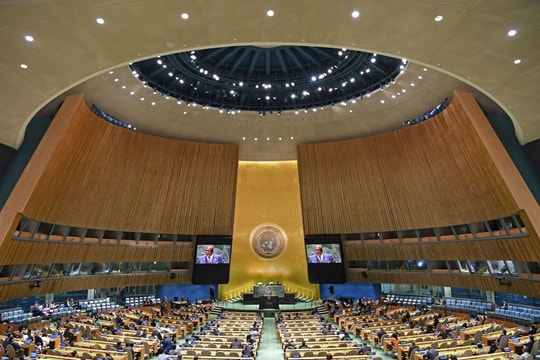When power is beyond your control
(Baonghean) - Despite previous commitments to accepting immigrants, it seems that Germany - Europe's largest economy - is having to rethink its so-called generous policy. The wave of immigrants that could reach 1.5 million people pouring into Germany this year is a difficult humanitarian problem for Chancellor Angela Merkel's government to solve. Even if it wants to, Germany will soon have to close its doors to immigrants.
Pressure beyond expectations
Information just published by the German newspaper Bild said that in the last 3 months of 2015, it is estimated that there will be up to 920,000 asylum cases in Germany, bringing the total number of asylum seekers in this country this year to about 1.5 million people. This number is 1.5 times larger than the official forecast of the German government when the number of asylum seekers in this country is only about 800,000 to 1 million people in 2015.
Citing information from a confidential report by German authorities, Bild newspaper also said that the pressure on the migration issue will increase in Germany as it is expected that 7,000 - 10,000 people per day will try to cross the border into Germany, even in the winter months, and this will be a serious burden for states and localities in Germany. In addition, reuniting families of refugees who have been admitted to Germany is also a difficult problem.
Because, the family structure in Middle Eastern countries usually has an average of 4-8 people/family. Thus, if each person receiving asylum status in Germany can request to reunite up to 8 relatives, this will be a terrible population pressure on Germany in the next few years, exceeding the resources that Germany can devote to social security. The above report also said that the means and facilities for emergency support for refugees in Germany, such as temporary housing areas, are currently overloaded.
 |
| Chancellor Angela Merkel. |
Thus, the efforts to prevent the flow of immigrants at the gateways in Central Europe in recent times seem to have not brought any positive results, when tens of thousands of immigrants still "slip through the net", passing thousands of kilometers and many checkpoints to reach Germany - the "favorite destination" of most immigrants to Europe. This worrying reality has caused many voices opposing the open-door policy for immigrants to appear more and more in Germany.
On October 4, speaking on German television ZDF, German Finance Minister Wolfgang Schäuble called on the European Union (EU) to quickly implement measures to limit the flow of refugees into the bloc instead of setting up border checkpoints or barriers within the bloc, which would not really help resolve the current crisis. Meanwhile, German Chancellor Angela Merkel remains resolutely opposed to limiting the number of refugees entering the country, despite increasing pressure from her conservative party and her ruling coalition.
The view of the female chairwoman of the Christian Democratic Union (CDU) is to oppose the restriction of accepting refugees from Middle Eastern countries (from Hungary), and also does not support amending and tightening asylum laws and closing borders with Eastern and Southern European countries to prevent the flow of refugees into this country. According to her, what is needed is a long-term strategy in accepting and integrating refugees, as well as speeding up the processing of asylum applications, in which priority is given to those who need protection in Germany. In addition, Ms. Merkel believes that it is necessary to strengthen EU border control as well as address the causes leading to the current wave of refugees.
Is Germany "open" to immigrants?
These recent moves reflect internal conflicts within Germany regarding its immigration policy. First, Germany, under the leadership of Chancellor Angela Merkel, has always been consistent with its open-armed immigration policy. Germany, together with France, has proposed the idea of allocating quotas to 28 member states to receive 120,000 refugees from the Middle East and North Africa. Germany supports the promulgation of a unified asylum law and a common EU list of safe migration origin countries. Germany is also determined to pursue a fairer immigration distribution ratio among EU member states. Clearly, Germany is showing its pioneering position in dealing with the wave of immigrants.
Germany is pursuing this policy because it hopes to breathe new life into its aging workforce. Chancellor Merkel has said the influx of migrants will change the face of the country in the coming years. Germany currently has the lowest unemployment rate since reunification - 6.4%. However, according to calculations, this large economy is still short of 140,000 workers, programmers and technicians. Service industries such as health care and entertainment will also soon fall short of skilled workers.
This means that Germany needs to fill the gap of 40,000 skilled workers this year alone. Therefore, a wave of migrants could be the solution to this problem.
However, despite the benefits for both sides, Germany is not necessarily a paradise for immigrants. The European Council (EC) on October 1 expressed concern about the increasing trend of racism in Germany. According to a report by the EC's Committee on Ethnic Minorities, demonstrations expressing racist and xenophobic attitudes, such as anti-Muslim, anti-Jewish or anti-immigrant sentiments, still occur frequently in Germany.
Attacks against asylum seekers have also increased, and the report specifically mentions demonstrations organized by the anti-Islam PEGIDA movement since last winter, which at one point attracted up to 25,000 people in the eastern German city of Dresden.
This contrasts sharply with the images that have become commonplace in recent weeks of trains carrying migrants and refugees, mainly from Syria, arriving at German train stations to enthusiastic welcomes from locals. It also contradicts recent opinion polls, which show that more than 60% of Germans support accepting migrants into their country.
In other words, the exploding influx of migrants and its economic and social consequences are causing Germany to be sharply divided between those who support and oppose immigration. And if Germany cannot resolve this disagreement, it is feared that Europe will also have difficulty finding a way out of the current migration crisis.
Thanh Son
| RELATED NEWS |
|---|








